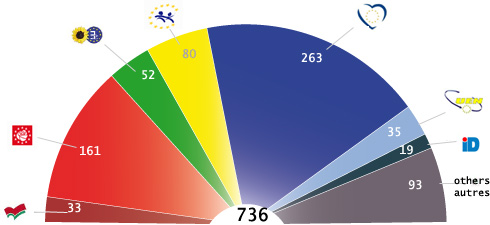European elections marked by the worst turnout in history (only 43% of Europe’s 388 million-strong electorate cast their votes) have done little to modify the allocation of seats in Brussels. But profound changes are emerging on the right and the left of the European Parliament.
The European People’s Party has confirmed its lead in parliament and won new seats. The Party of European Socialists maintains its second-ranked position, but has given up a substantial number of seats. However, in practical terms, this loss will be offset by the significant growth of the Greens, who have emerged as the fourth largest group, and the hard left, which conserved its share of MEPs and even won some new seats. Confirming its role as a key player in the balance of power, the liberal ALDE, which sides with the Right on some votes and with the Left on others, remains the third largest group, while right wing parties that are unequivocally hostile to the process of European integration scored significant successes in a number of countries (Netherlands, Austria, Hungary, and the UK).
However, this picture of limited change may be the harbinger of a substantial transformation of the European political landscape. The moderate right parties performed well in two radically different contexts: in countries where they are in power — France, Italy and Germany —the campaign message of a quiet force, that is able to anticipate and soothe voters’ worries proved to be highly successful. In countries where they are in opposition — Spain and the UK — they were able to cash in on a protest vote, which aimed to punish governments for the current economic crisis.
On a European level, socialist parties appear to be suffering from a crisis of language, a near aphasia that prevents them from reaching out to their traditional supporters and potential new voters — rather than a political crisis. Finally, there is another extremely important element: the success of xenophobic and extreme-right groups in the Netherlands, the UK, Austria, Hungary, and even Finland, where fear of social change that has been accelerated by the economic crisis won support for campaigns that expressed anger and hostility, and demanded the imposition of a racist moral order.
The results, which largely reflect the current balance of power in the European parliament, will likely remove any further obstacles to the reappointment of José Manuel Barroso as president of the European Commission. However, the Party of European Socialists is also expected to demand that one of its members be awarded the future post of President of the European Union, as described in the Lisbon Treaty. In that case, the candidate that appears to be the least “socialist” in outlook will have the best chance of gaining the approval of the Right of the house. British ex-prime minister Tony Blair may be the likely choice.
Was this article useful? If so we are delighted!
It is freely available because we believe that the right to free and independent information is essential for democracy. But this right is not guaranteed forever, and independence comes at a cost. We need your support in order to continue publishing independent, multilingual news for all Europeans.
Discover our subscription offers and their exclusive benefits and become a member of our community now!












